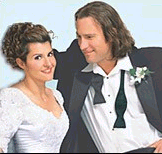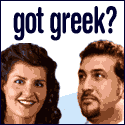
|
SUMMER'S TOP MOVIE PICK FOR GREEK-AMERICANS: "MY BIG FAT GREEK WEDDING"
By Christos and Mary Papoutsy Publishers of Hellenic Communication Service
Nia Vardalos, the Greek-American star of the movie, plays the role of a 30-something daughter --Toula Portocalos --of an immigrant Greek couple who own Dancing Zorba's Greek Restaurant in Chicago. Of course, mousy Toula works in the family restaurant, but wishes for more than what her family expects. Rather than marrying a nice Greek boy, bearing Greek children, and feeding everyone, Toula wants to attend college classes. How Toula and her mother conspire to receive her father's approval for the classes will send Greek-American women into an uproar. Lainie Kazan who plays the role of Toula's mother, delivers a great one-liner: in Greek families, men may be the head of the household, but women are the neck and can turn the head any way they want. Toula and her mother succeed and Toula takes classes. But Toula's efforts pay off in other ways. Her self-esteem rises, and she transforms herself, with the aid of cosmetics and an updated wardrobe, into a veritable Greek-American princess, waiting for her prince to sweep her off her feet. Enter Ian Miller, played by John Corbett of TV's Northern Exposure and Sex in the City. And they do fall in love, unknown to her family. The only problem is that he isn't Greek. The comedy reaches a zenith when Ian Miller, now her steady boyfriend, asks her to marry him and she brings him home to meet her family. As expected, the father (Michael Constantine) flatly refuses. But viewers will roar with laughter, recognizing the old-fashioned, steadfast refusal of the father to accept this young man from a very traditional, Anglo-Saxon family. Papa, who believes that all knowledge emanates from the Greeks, attempts to introduce Toula to a succession of unsuitable suitors, in an effort to stave off the inevitable. Eventually, Toula wins out and her family relents. But not before a series of hilarious scenes in the church, as Ian becomes baptized in a children's swimming pool, and when Ian's parents first meet the Portocalos family. Even Toula's old Yiayia, who doesn't speak any English and who thinks that the Greeks are still fighting the Turks, yields at last. True love prevails and Toula's family welcomes and envelops the fine insider into their fold; the couple become part of the extended Portocalos family, a fine ending for this funny, heart-warming story of love.
We believe that this movie will be best appreciated by Greek-Americans who grew up with Greek immigrant parents or grandparents and who lived alongside a significant non-Greek population. Toula's struggle with her ethnic identity as she reaches maturity and builds a life for herself will resonate with Greek-Americans who have themselves grappled with the issue of cultural disparity between their own families and those around them. Many a youngster of Greek background has experienced the "otherness" or alternity of being different, a process clearly highlighted in this movie. Furthermore, statistics gathered recently by the Greek Orthodox Archdiocese of America also bring to light the full extent to which "outsiders" or "xenoi" have become integrated into Greek-American families. The vast majority of marriages today are to spouses who are not Greek Orthodox, indicating, of course, that the process of welcoming a non-Greek into a Greek-American family is commonplace.
More about "My Big Fat Greek Wedding" |
|



